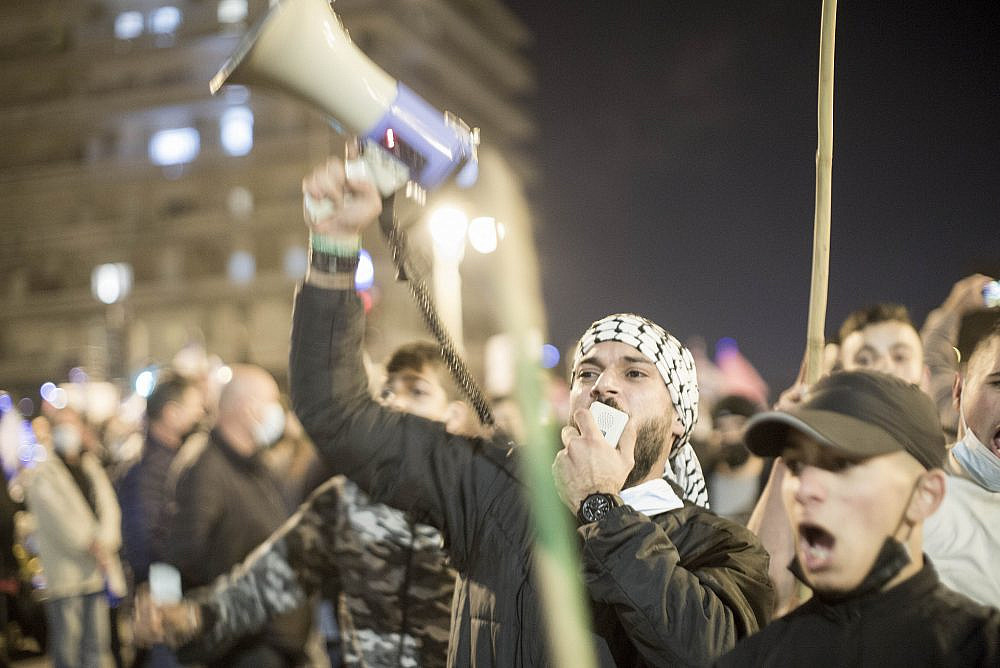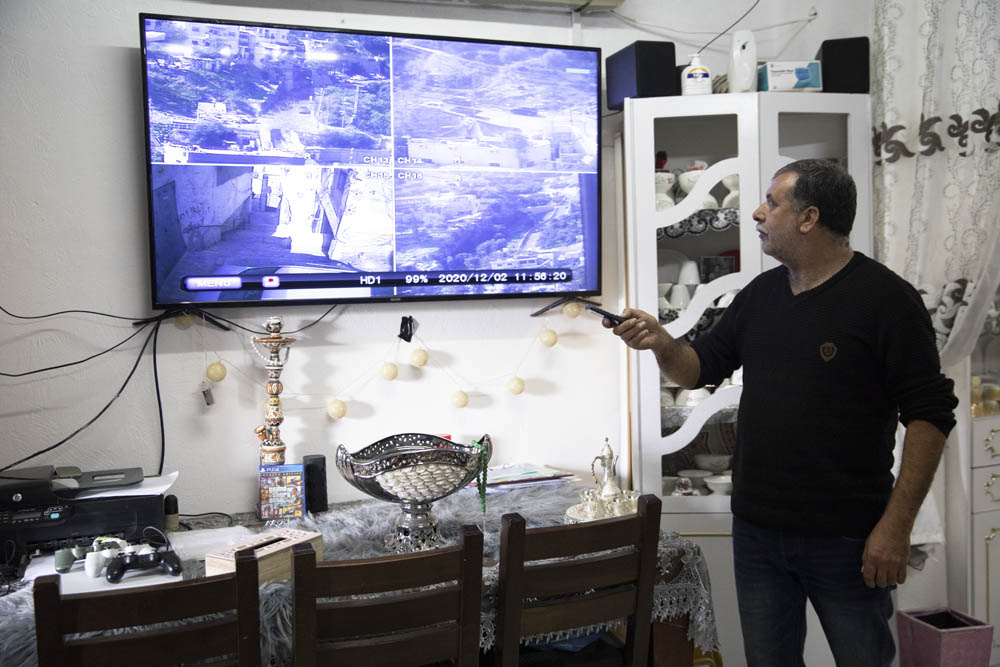Zoheir Rajbi has been feeling encouraged, almost optimistic. In early February, hundreds of Israelis came to his community of Batan al-Hawa in the East Jerusalem neighborhood of Silwan, where he has been leading the struggle against evictions of Palestinian families. Together with dozens of Palestinians, the Israeli activists led a march from Silwan to Balfour Street, the locus of the anti-Netanyahu protests that have been taking place regularly outside the Prime Minister’s Residence for the past year.
The march was a rare sight in East Jerusalem, and particularly in Silwan, a neighborhood of 60,000 Palestinians and several hundred Jewish settlers.
Backed by 20 years of state-led Judaization efforts, the settlers are constantly accompanied by publicly-funded security guards and travel around in armored vehicles; they receive all their public services, such as education and health, in other neighborhoods in Jerusalem.
Batan al-Hawa is located at the heart of Silwan and is home to over 10,000 Palestinians. Since 2001, the Israeli settler organization Ateret Cohanim has been trying to establish a Jewish neighborhood in Batan al-Hawa. In 2004, settlers associated with the group took over two buildings in the area that were purchased by a Palestinian front man. The first, Beit Yonatan, is a six-story building illegally constructed for settlers living in Silwan. The second, Beit Ha’Dvash, is a small one-unit building located 100 meters from Beit Yonatan.
Since 2015, four more Palestinian homes have been taken over by Ateret Cohanim, bringing the total number of evicted Palestinian families to 14. Dozens more are waiting for court rulings on their cases. Since the beginning of 2020, the Jerusalem Magistrates’ Court has ordered the eviction of 23 additional families (each family is in different stages of appealing their eviction). Around 200 Palestinian families are under threat of being kicked out of their homes.

The basis for Ateret Cohanim’s claims is the Legal and Administrative Matters Law of 1970, which stipulates that Jews who owned property in East Jerusalem and lost it during and following the 1948 war can demand it back from the Custodian General. This stands in stark contrast to the Absentees’ Property Law of 1950, which decrees that Palestinians who fled or were expelled during the 1948 would not be entitled to return to the properties they lost in the exact same war.
“It was exciting, the mix of people who marched with us to Balfour,” says Rajabi at his home, which is under threat of being taken over by settlers. “People had a lot of [energy] to get out. In all of the demonstrations we have had to date in Silwan, the police have always attacked us, there have been arrests and complete chaos. Suddenly you march and yell and no one accosts you. We walked near the entrance to the Western Wall, City of David, Mamila, all the way to Balfour. It’s like you’re in prison and suddenly the doors open. We reached Netanyahu’s house. The young people shouted ‘Bibi is a thief.’ Now people in the neighborhood are asking me when the next demonstration is happening.”
The march was organized by local residents along with the Israeli NGO Peace Now, and was joined by several activist groups that regularly demonstrate in front of the Prime Minister’s Residence.
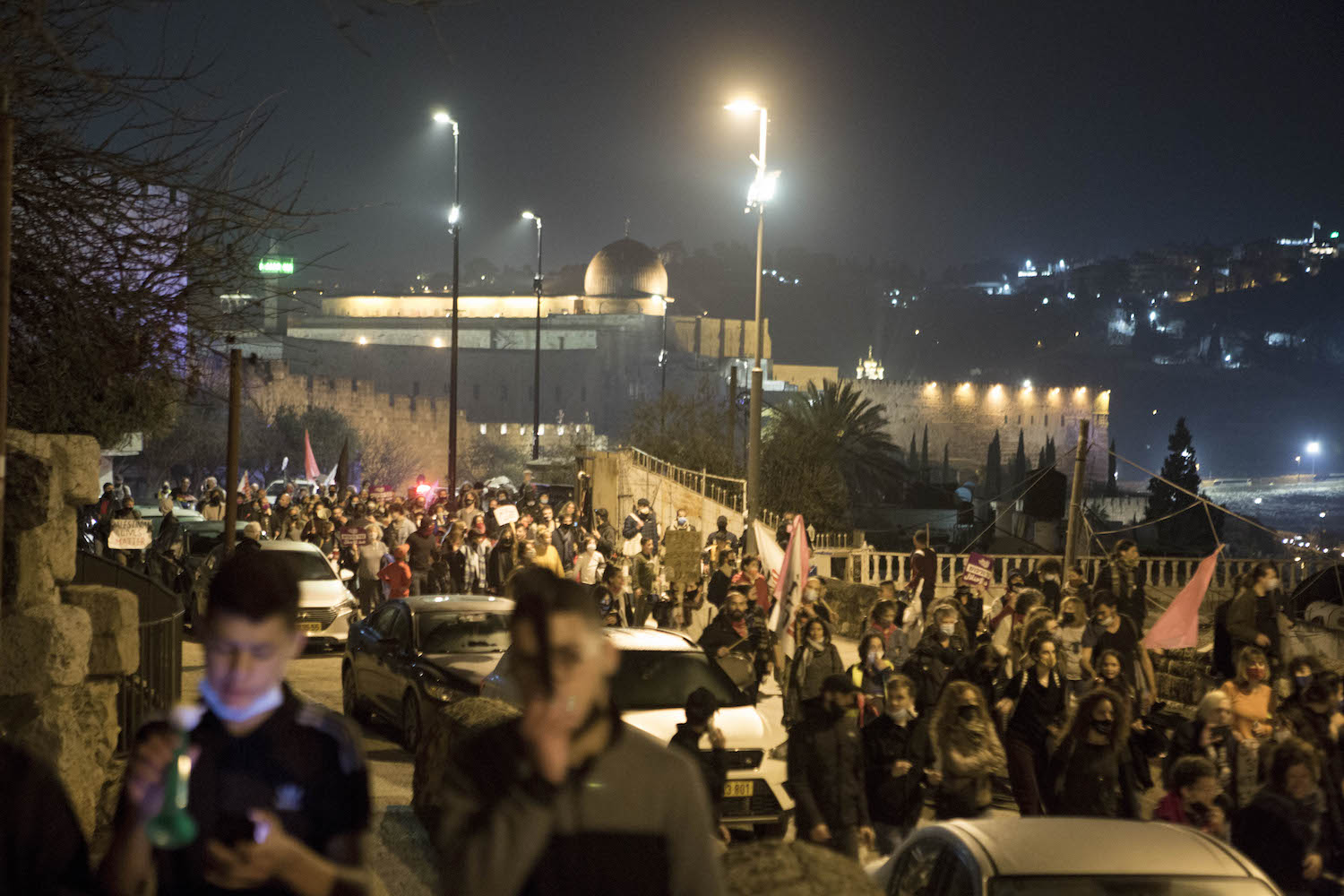
How did the demonstrators in Balfour respond to your protest?
“People were happy and congratulated us. It’s not every day that they hear Arabic at demonstrations there. They said, ‘Of course we do not agree with [the evictions], this is the work of Bibi Netanyahu.’ We arrived in large numbers; 25 people came from my family alone. There were many Israelis who visited Silwan for the first time to learn what is going on here. There were almost a thousand people in total.”
How do you explain the reality to Israelis who have never heard of Silwan or the evictions there?
“People in Balfour knew there is a place called Silwan, but they did not know that there are eviction orders against 1,000 people. I was surprised by the amount of people who came and saw everything that was happening. I spoke Hebrew and Arabic and said that we are peace-seeking people, not terrorists like we are often characterized. We have owned these homes since the 1960s, before the occupation of Jerusalem. We have lived here until 2015, when suddenly Hekdesh Benvenisti [a Jewish trust established in 1899 to oversee development in Silwan, and today is under the auspices of Ateret Cohanim] said that this was their land and they want to remove us from 86 homes. They don’t want to buy just one house, they want the entire neighborhood.
“This is government policy, state policy. Bibi is leading this entire game. He gave the power to the settlers in Jerusalem to take over homes and land, and he allows bodies such as the Jerusalem Municipality, the JNF, and the Custodian General to carry out demolitions and eviction orders.”
‘If Netanyahu goes, we’ll see a change’
Rajbi, 50, is one of the leaders of the struggle against evictions in Batan al-Hawa. From his home, one can see Jerusalem’s Old City and Al-Aqsa Mosque compound — a view that partly explains the settlers’ motivation to take over the area. Down the street are Beit Yonatan and Beit Ha’Dvash, which are home to settlers who are protected by armed guards.
In his living room stands a television screen connected to 20 security cameras posted around the home that operate 24 hours a day, to capture any instance of police or settler violence.
Rajbi sees a clear connection between Netanyahu’s corruption and the situation of Silwan. “A prime minister who steals will allow [the settlers] to steal homes here. The people who are out protesting in Balfour do not justify it and know that he is corrupt. They know that he is not good for their country, that he leads them to war. Bibi has gotten used to sitting on the throne for years, like Arab dictators, and doesn’t want to leave.”
Some of the protesters in Balfour believe Netanyahu is the only problem. Do you believe that if he goes things will get better in East Jerusalem?
“I think if Netanyahu goes there will be a change — even in our laws, in the behavior toward us, in the way the police behave. Lately, police officers who know we are from Silwan or from Batan al-Hawa have taken a firmer hand with us. If they replace the government, I am 80 percent sure there will be change.”
Do you think that more Balfour protesters will regularly join your struggle?
“I know the Israeli [activists] who regularly come here, but those who came last week were new. We didn’t have an initial meeting with them, we just started talking [at the march]. There are a lot of people who took my contact details and told me ‘we are with you.’ A few even called after. They should come and see how families and children are thrown into the streets.”
Ateret Cohanim claims that the land the Palestinian homes were built on was purchased over 100 years ago by the Hekdesh Benvenisti trust. According to records, Hekdesh Benvenisti bought the plot at the end of the 19th century to build a neighborhood for Jews who had arrived in Palestine from Yemen. In the 1930s, as tensions rose between Jews and Arabs, the British Mandate ordered the Jewish residents to leave the neighborhood and the trust was abandoned.
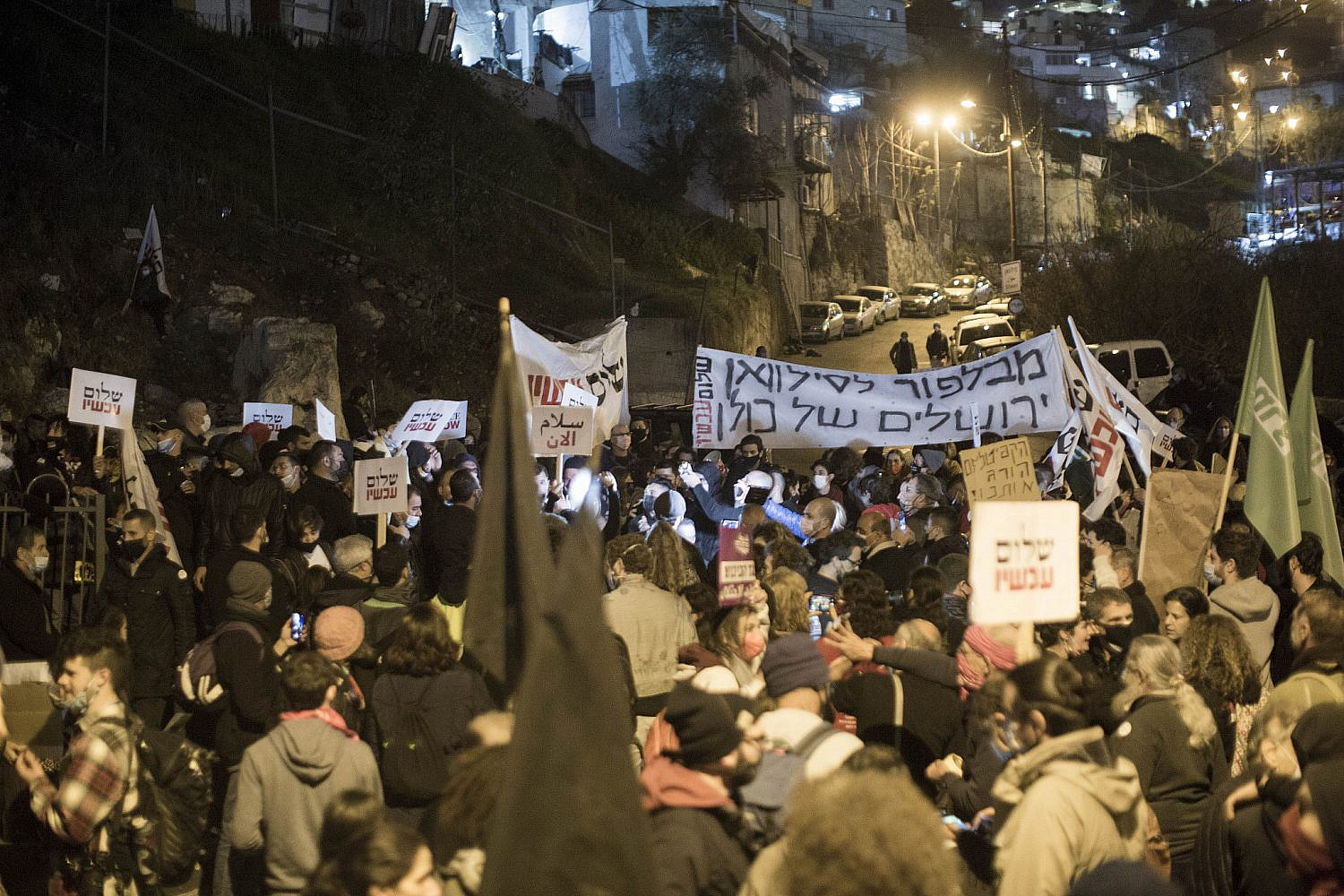
In 2001, Ateret Cohanim took over the management of the trust, after Palestinians had already been living in the area for decades. The organization began building houses, and selling and buying apartments. In recent years, Ateret Cohanim has used the trust to demand the eviction of Palestinians from their homes.
“We see [right-wing] Knesset members and local council members coming here to visit the houses taken over by the settlers,” Rajbi says. “It’s a matter of policy, not of a person who has bought a house and wants to be a neighbor. Whoever wants to come and be a neighbor will really come, but not sleep and think all night about how to take a house and another house, and then throw you out of your own house.”
There are currently dozens of cases and appeals pending in the courts. Do you believe the courts will help you?
“When I come to the courtroom, I do not see a judge. I see a man from Ateret Cohanim sitting on the judge’s chair. I was present for most of the trials regarding the homes. Sometimes the settlers’ lawyer forgets his words, so the judge finishes his sentence so that [the lawyer] doesn’t make a mistake. So how can I believe in an Israeli court? I have no choice, I have to go to the Israeli court because I have no other place. I know they will not give me what I deserve, but I must go there.”
Last month, as part of an appeal to the Supreme Court over the decision to evict the Dweik family from their home in the neighborhood, Justice Dafna Barak-Erez ordered the attorney general to clarify his position regarding the evacuation of the homes. This, says Hagit Ofran, who runs Peace Now’s Settlement Watch project, is an unusual step in civil law. “The state is invited to give its position,” explains Ofran. “If [the state] supports [the eviction], it will become an active partner in it.”
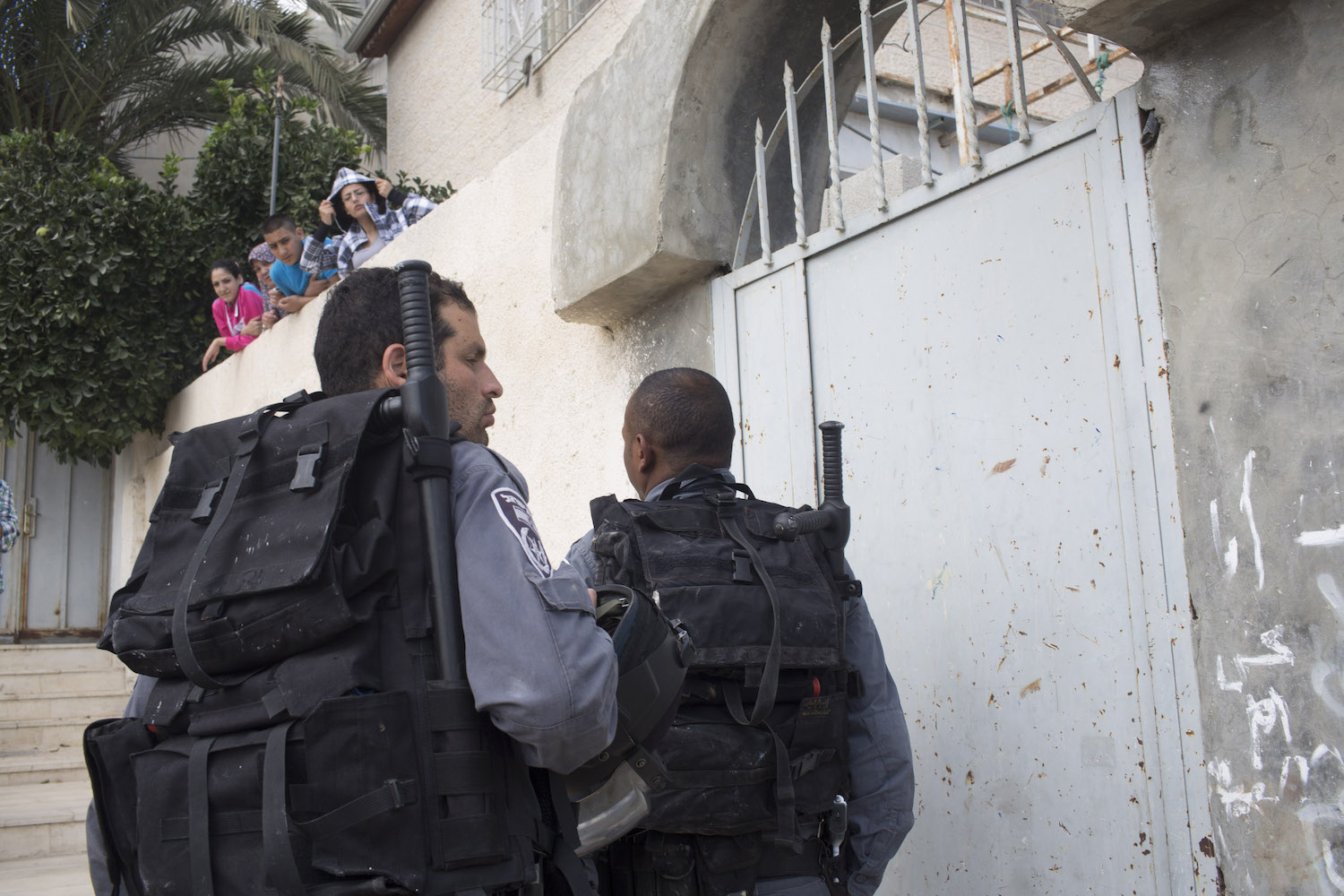
Rajbi’s father used to work in a bakery and lived in the Jewish Quarter of Jerusalem’s Old City, before moving to Silwan in the 1960s. From 1967, when Israel occupied East Jerusalem, until the early 2000s, the Israeli authorities did not try to evacuate the residents and even recognized their ownership over the homes.
“My father did not have money to build [a home] for his sons, so he went to the municipality and got permission to build a 30-meter home on the roof for my brother. He took out a loan and the bank had documents of the house until we finished paying it off. He built more than was allowed and received a fine, but not an eviction order or anything else.”
Why did the eviction proceedings ramp up in 2015?
“The settlers started [with their eviction campaign] in the City of David, in Wadi al-Hilweh. They currently cannot establish the Third Temple, so they are working diligently to take over the land and homes in Silwan. They are evicting Palestinians and replacing them with settlers, along with the tunnels being built here under our homes. It will be easier for them to control this area.”
The wave of evictions in 2015 and the increase in the presence of settlers in the neighborhood also brought about additional friction with the police, who patrol the area throughout the day, with regular Border Police presence inside Beit Yonatan.
“We face problems every day,” continues Rajbi. “[Police] come to arrest us or settlers shut down the road. We set up a youth center so that the children here can play and learn without trouble. Since 2015, 300 boys under the age of 18 have been arrested. After the municipality saw that the center was working well, they said, ‘Let us give you money, we will cooperate.’ We told them no thanks — they can set up a center themselves.”
What are your thoughts about the future of the neighborhood and the struggle against the evictions?
“I’m a very strong person, but sometimes I say to myself: if the day comes and I am kicked out of the house, what will I do with myself and the children? I have no problem with Jews living here, but I want to ask you: what Jew will come to live here without all the municipal services, with the [poor] state of the infrastructure? I am 50 years old, all my life I have been here. This is where I grew up and got married, I have grandchildren. All the beautiful things and my hard days were here. Arrests and imprisonment. I’ve seen both evil and good. I’m already programmed to live here. I can buy a house elsewhere, and the settlers even offered that to me — but it will not work out for me there. This is my kingdom.”
This article was first published in Hebrew on Local Call. Read it here.


